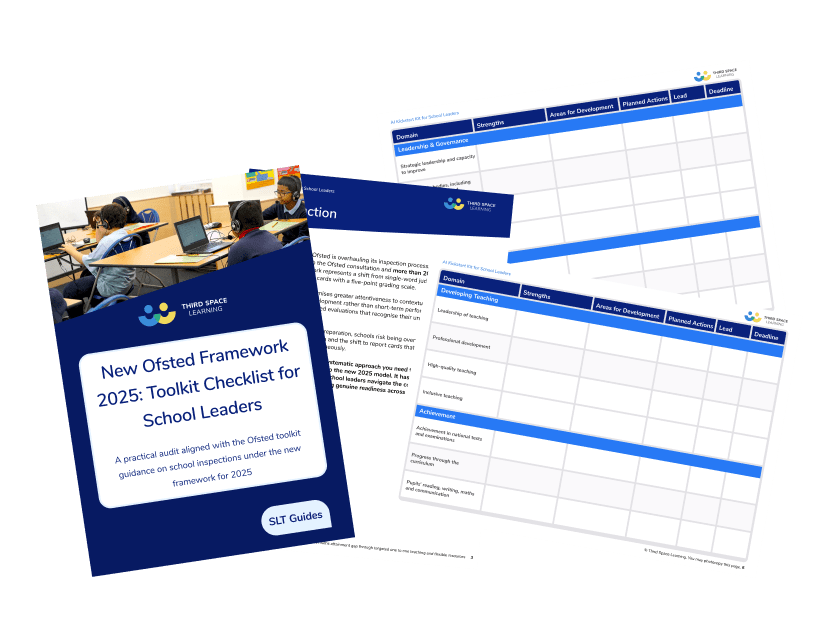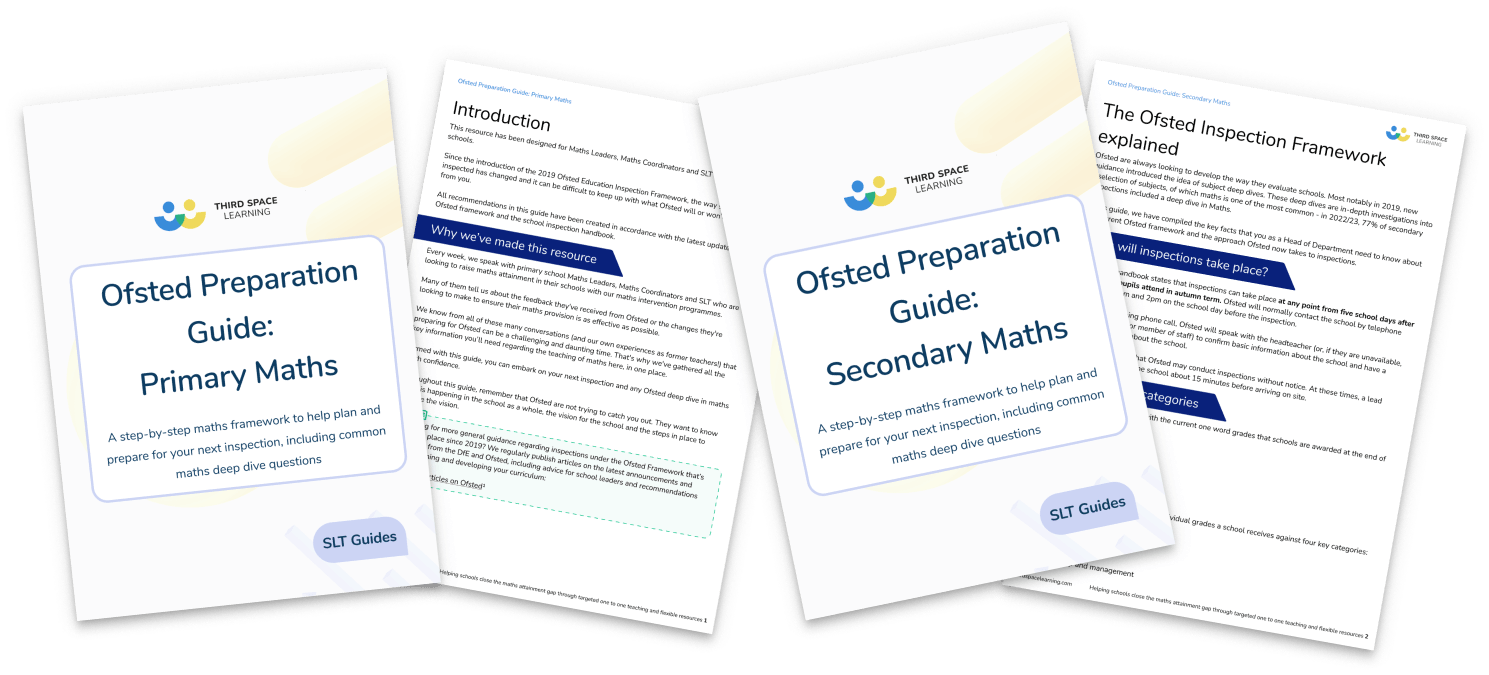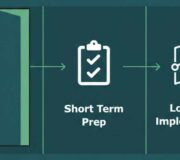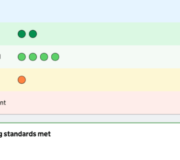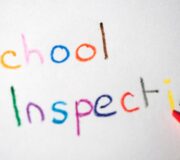Teachers’ Guide To The Ofsted Maths Research Review
This article was originally posted on 26th May 2021. Ofsted has recently released its new Ofsted framework 2025, which uses a new inspection framework.
The new Mathematics Research Review from Ofsted (published 25th May 2021) sets out their findings from the research literature regarding the sort of curriculum and teaching that best supports all pupils to make good progress in maths throughout their time in school.
Following this review of the research, Ofsted will, later this year, publish a report that looks at how schools are implementing such best practice in maths teaching and learning.
Here we take a look at some of the important points from this research review and how they may inform your teaching and leading of mathematics at primary and secondary school.
A great mathematics curriculum should, as the education inspection framework (EIF) puts it, help pupils to ‘gain enjoyment through a growing self-confidence in their ability’.
We at Third Space Learning know that maths is amazing and we want every single one of our young people to share our passion for it. Maths ‘nurtures the development of a logical and methodical mindset’ and gives us incredible tools to help us to understand the world.
It can open doors for our pupils in a dazzling array of fields, such as engineering, physics, architecture, medicine and business, and literally transform lives.
With 18,000 pupils receiving maths lessons from us every week, we need to make sure that we are delivering the most effective experience possible for them. A report like this, whether you agree, or disagree, with the findings, is an important one.
Ofsted Preparation Guides
Prepare for your next inspection with this step-by-step math framework. Includes checklists and questions for an Ofsted deep dive in math.
Download Free Now!Principles underpinning the review process
At the start of the review, Ofsted provides some idea of the principles underlining their review process; these are worth sharing here for all educators to use a framework for reviewing their own curriculum and pedagogy in maths:
- scope, content and sequencing of the curriculum
- specification and ordering of component parts that make up composite skills
- the value of teachers’ subject knowledge
- promotion of a range of quality interactions with pupils
- quality and pacing of instruction
- how to avoid cognitive overload
- the value of deliberate practice, interleaving and regular low-stakes testing
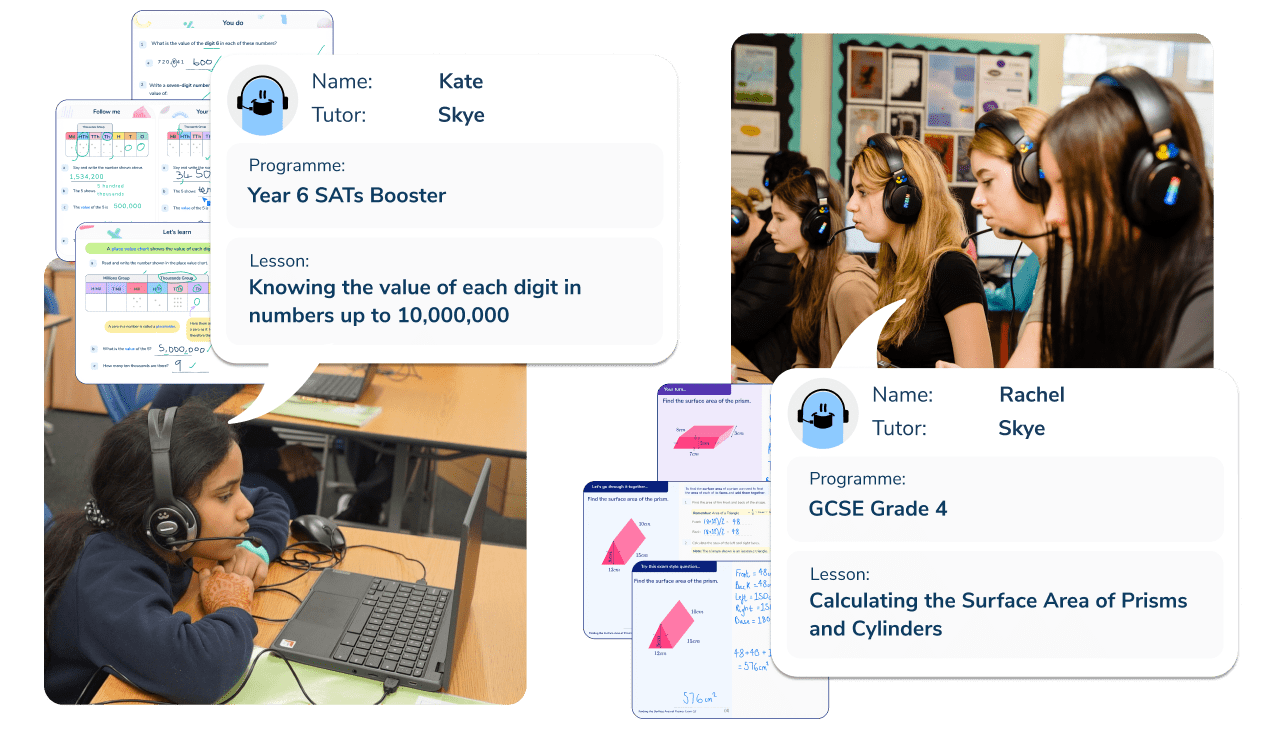
Meet Skye, the voice-based AI tutor making maths success possible for every student.
Built by teachers and maths experts, Skye uses the same pedagogy, curriculum and lesson structure as our traditional tutoring.
But, with more flexibility and a lower cost, schools can scale online maths tutoring to support every student who needs it.
Watch Skye in actionDistinction between curriculum and pedagogy
The report also makes clear early on a distinction between mathematics curriculum and mathematics pedagogy which again we’re including here as it informs many of the findings – and how their report is structured.
Mathematical curriculum knowledge is classified into three types, declarative, procedural and conditional.
- Declarative knowledge can be prefaced with the sentence stem ‘I know that’ and consists of facts and concepts.
- Procedural knowledge can be prefaced with the sentence stem ‘I know how’ and consists of a sequence of steps.
- Conditional knowledge can be prefaced with ‘I know when’ and focuses on strategies to reason and problem solve.
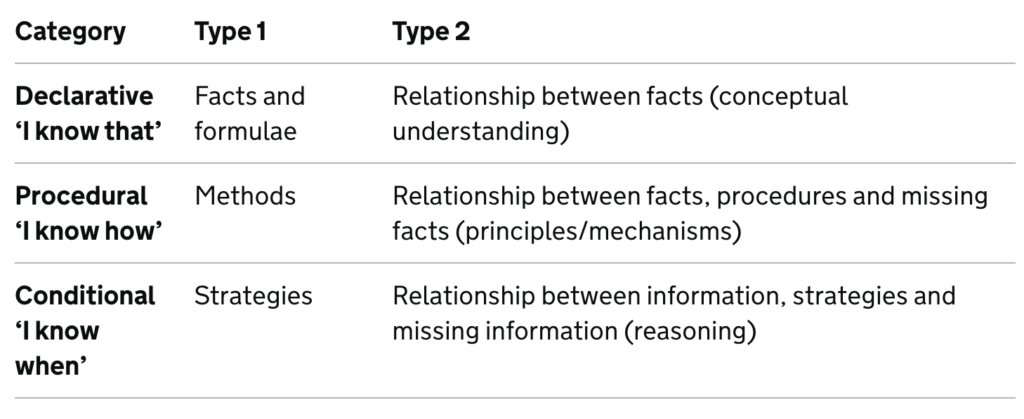
The review states that when pupils use each of these types of knowledge (ie declarative, procedural, conditional) their knowledge of the relationships between concepts develops over time.
Consequently when looking at the pedagogical approaches that support this knowledge, teachers should be providing opportunities that enable pupils to practise and apply these facts, concepts, methods and strategies.
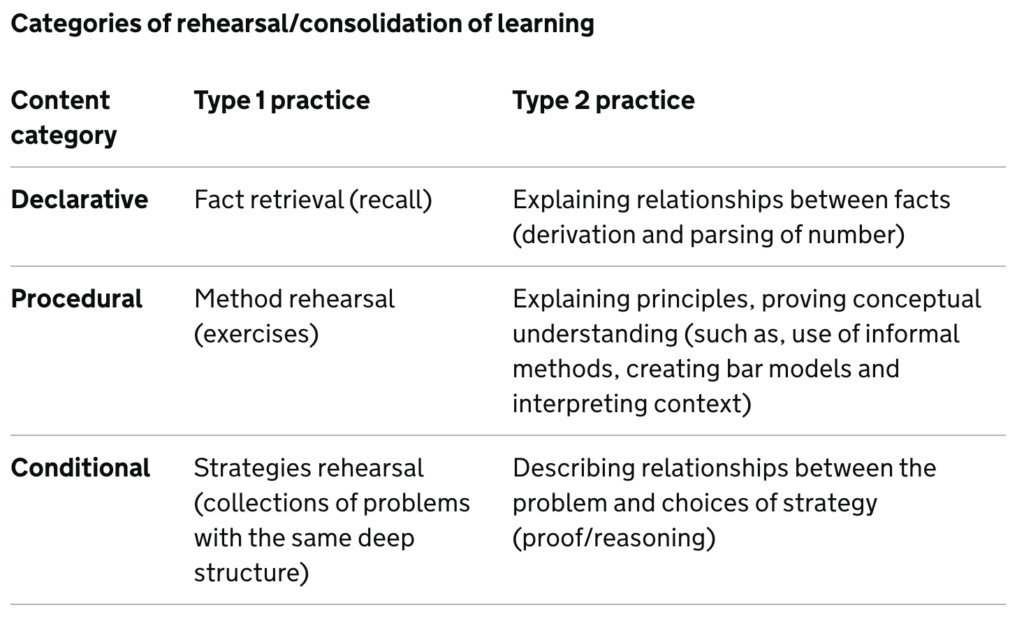
Key findings from the maths research review
While recognising that there is no one way of ‘achieving high quality’, the Ofsted research review highlights many elements that contribute to ‘high-quality school maths curriculums, assessment, pedagogy and systems’. The report goes on to explore these.
The following are 7 key findings from the research which we hope will be useful in helping you to understand the context in which Ofsted will be working and assessing the curriculum and teaching of maths in your school.
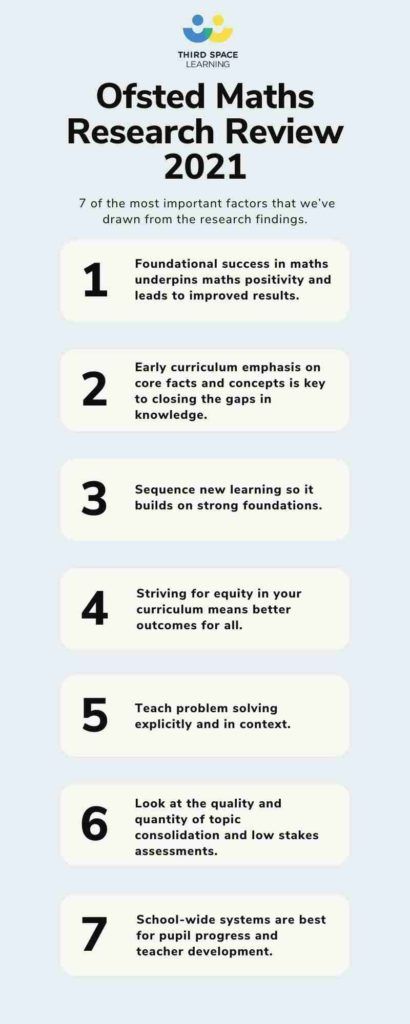
1. Foundational success in maths underpins maths positivity and leads to improved results
The report states much of what we already know to be true: that despite English pupils achieving on average a higher attainment in maths than in many other countries, the gap between advantaged and disadvantaged pupils remains stubbornly wide, with disadvantaged English pupils ‘much less likely’ to achieve a Grade 4 in maths at GCSE.
Maths is all too often regarded as for a special few; it is an issue that is societally wide. We can hear pupils (and adults) all too often exclaim how they are ‘not a maths person’ when presented with calculations or a problem to solve.
Ofsted’s report found that it doesn’t need to be this way and that maths anxiety is not a result of the nature of the subject but rather a ‘failure to acquire knowledge’.
Pupils are more likely to develop a positive attitude towards mathematics if they are successful and they know that they are successful.
Ofsted recommendations:
- Teachers should distinguish between pupils making infrequent errors that can be opportunities for learning, and consistent mistakes which imply ‘weak foundational knowledge’.
- Focusing on core content initially allows pupils to develop motivation which then helps them to develop a greater ‘breadth and depth’ of understanding later.
- Ensuring that pupils acquire ‘core mathematical knowledge’ will allow them to start to experience success and therefore begin to associate maths with ‘enjoyment and motivation’.
Closing this attainment gap is a central theme of current national policy, as highlighted in the wider curriculum and assessment review and report, which seeks to ensure the curriculum remains accessible for all learners.
Over 50% of the pupils Third Space Learning supports with our intervention programmes are in receipt of free school meals and we are really pleased to see this focus from Ofsted on striving to close the attainment gap.
Our one to one maths programmes are designed to adapt to the needs of the individual, developing core skills along with reasoning and applied mathematical skills.
By having a consistent tutor we aim to support pupils to build confidence and belief in their mathematical abilities. We know that everybody, with the right intervention and support, can succeed in maths.
As one maths lead and assistant headteacher said about the Third Space Learning approach: “The most important thing is that the intervention is changing attitudes to maths. It takes away the intimidation with maths. We noticed in the classroom that these pupils were able to articulate their maths much better than the other pupils not on the intervention programme”.
2. Early curriculum emphasis on core facts and concepts is key to closing the gaps in knowledge
Many pupils start school with some degree of mathematical knowledge, however the report references research that finds this is not necessarily the result of any ‘natural ability’, but rather an indication of exposure to basic maths at home. Of course EYFS and KS1 teachers often do an incredible job here already to develop number sense in the early years of school but there’s no doubt that differences in the home environment have a big impact.
Ofsted recommendations:
- Teachers can ‘engineer the best possible start for pupils’ by closing the school-entry gap in knowledge through teaching pupils core facts, formulae and concepts which form the building blocks for the next stages of education.
- Focusing on a systemic approach to teaching the component parts of key topics such as shape and number can help disadvantaged pupils to ‘match or even exceed the attainment of their more advantaged peers’.
- Rather than having to rely on derivation or guessing, teachers should help pupils to develop ‘automatic recall’ of key concepts to prevent their working memory from becoming overloaded.
- Following a ‘highly systematic’ approach and giving teachers access to coherent resources for planning, instruction and rehearsal of content can lead to ‘better attainment’ while giving teachers the freedom to choose how to teach.
At Third Space Learning, our intervention programmes are able to use diagnostic assessments to identify exactly where the gaps in a pupil’s knowledge are, in order to produce a personalised series of lessons specifically designed to close them.
The personalised 1-to-1 nature of our lessons means that pupils are able to work at their own pace with carefully structured individualised support to aid understanding of a topic.
READ MORE: Ofsted Deep Dive Into Maths
3. Sequence new learning so it builds on strong foundations
The report reiterates the importance of a well-structured curriculum that is planned from the beginning of a pupil’s education. It stresses the importance of ‘detail, sequencing and alignment of content’. The report also suggests that only once key skills have been mastered can procedural understanding begin to develop the relationships between core facts.
Ofsted recommendations:
- New content should ‘draw on and make links with’ previously acquired knowledge following a carefully sequenced curriculum that is ‘intelligently designed’.
- Before more complex strategies are taught, pupils should be confident using the linked facts and methods that form the strategy’s ‘building blocks’.
- Teachers can then use this knowledge to teach topic-specific strategies to pupils and show them how to match them to specific types of problems.
- Problem-solving strategies are best taught once pupils can ‘recall and deploy facts and methods with speed and accuracy’.
The Third Space Learning online lessons and downloadable slides are carefully designed to develop and build upon previous knowledge over time. They test and revisit key concepts before providing opportunities to apply these strong foundational skills to specific problem solving.
For pupils receiving weekly one to one lessons from our tutors, learning is personalised to suit their needs and is designed to help them plug individual gaps over time. Lessons begin with an introduction to the concept, and then some practice of the relevant skill progressing to more complex problem solving. Our aim is to build reasoning throughout the lesson and, where appropriate, extend it with non routine problems that demonstrate deep understanding. Pupils only move on to the next section of the lesson or the next learning objective when their tutor feels they’re ready.
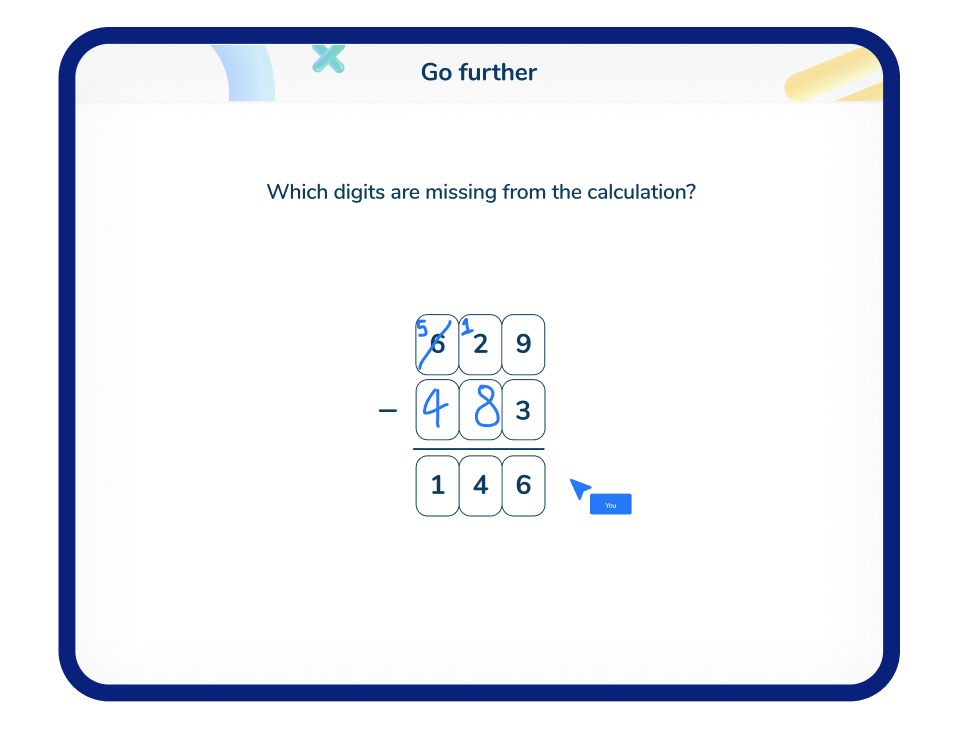
4. Striving for equity in your curriculum means better outcomes for all
The report addresses the challenge familiar to all teachers of balancing additional support in class to enable pupils to keep up with their peers with the alternative – reactive approaches required when children have fallen behind. Using the examples from Asia, it’s clear that a powerful curriculum and plenty of opportunities to engage in purposeful, intelligent practice lead to better outcomes for all pupils.
There are also recommendations for harnessing the strengths of pupils with SEND and the value of a systematic curricular approach to give pupils with SEND and disadvantaged pupils a better chance of success.
Ofsted recommendations:
- Wherever possible your goal should be to keep all pupils learning together as it raises the bar for the lower attainers.
- Pupils should not be rushed through a topic and some may need more time than others – try to provide it.
- Adapt the curriculum to the needs of your learners.
“Pupils with SEND benefit hugely from explicit, systematic instruction and systematic rehearsal of declarative and procedural knowledge.”
It is almost inevitable that ‘reactive approaches’ will be required for some pupils. The reasons of course vary for this but it takes a teacher highly skilled in mastery teaching and well resourced in her preparation time to move an entire class of 30 individuals through the maths curriculum at the same rate.
Where maths interventions are required one to one teaching is consistently shown to be one of the most effective methods of accelerating learning and filling in gaps provided it is fully personalised to the individual’s needs and prior knowledge.
A crucial stage in the Third Space Learning intervention model is the diagnostic assessment to establish both the cognitive level and the content domain gaps.
We also encourage teachers to highlight any SEND needs a child may have in advance so their individual sequence of lessons can be fully personalised with appropriate support and scaffolding.
5. Teach problem solving explicitly and in context
WIthout a doubt it is this area of the research review that has caused the most disagreement amongst teachers.
It’s true that problem solving can be difficult if the facts or methods required to tackle the problem are not embedded in the pupil’s long term memory. If foundational knowledge, such as number bonds and basic mathematical operations, is insecure, pupils are less likely to be able to break problems down into their constituent parts and work out a solution.
However the conclusions that Ofsted came to in this regard are not universally accepted by maths teachers.
In their review of the research Ofsted recommends that pupils should be fluent in all of the relevant skills before they apply them to problem-solving. Then careful sequencing of content, instruction and rehearsal can show pupils new and consistent patterns of useful information.
In order to experience success when problem solving, pupils need to ‘systematically acquire core mathematical facts, concepts, methods and strategies’.
Ofsted recommendations:
- Teachers could use a curricular approach that better engineers success in problem-solving by teaching the useful combinations of facts and methods, how to recognise the problem types and the deep structures that these strategies pair to.
- Strategies for problem-solving should be topic specific and can therefore be planned into the sequence of lessons as part of the wider curriculum. Pupils who are already confident with the foundational skills may benefit from a more generalised process involving identifying relationships and weighing up features of the problem to process the information.
- Open-ended problem solving tasks do not necessarily mean that the activity is the ‘ideal means of acquiring proficiency’. Open ended problem-solving activities – while enjoyable – may not necessarily lead to improved results. Worked examples, careful questioning and constructing visual representations can help pupils to convert information embedded in a problem into mathematical notation.
Systematic instruction might offer benefits beyond ‘enhanced learning of facts, methods and strategies’, this is because pupils who are more successful develop better learning behaviours.
Third Space lessons have been designed from the ground up with cognitive load theory in the classroom in mind to ensure that working memory is not overloaded. Tasks are broken down into small manageable sections with key elements highlighted and discussed.
Clear, stepped worked examples lead immediately into practice problems.
Interleaving worked examples with related questions allows for pupils to continually practise the lesson objectives without overloading working memory.
Pupils are encouraged to explain and clarify their reasoning at each stage of the lesson as the complexity of the topic slowly increases. Pupils then attempt practice problems that are rooted in variation theory and designed to highlight and address key misconceptions.
6. Look at the quality and quantity of topic consolidation and low stakes assessments
Ofsted found that practice should go further than demonstrating ‘immediate accuracy and understanding’. Careful consideration should be given to the ‘quality and the quantity of practice’ to prevent pupils forgetting key knowledge over time.
Ofsted recommendations:
- Teachers should plan frequent, low-stakes assessments throughout the ‘learning journey’ to help pupils prepare for assessments that focus on what pupils have actually learnt.
- Using low stakes testing to ensure that pupils are well-prepared for assessments will not only increase knowledge retention, but also improve pupils confidence in maths.
- Using lessons to incorporate timed testing can help pupils to develop fluency and give teachers the reassurance that ‘pupils are not reliant on derivation’ to calculate their answers.
- By planning assessments to ‘engineer proficiency’ and promote success, pupils can see tests as ‘moments to shine’ and even look forward to them.
Each of the Third Space Learning intervention lessons contains opportunities to consolidate pupil learning, through considered practice, and applied and exam-style questions. Our Maths Hub contains hundreds of resources to help teachers support their pupils, including our range of diagnostic assessments and our hugely popular Fluent in Five scheme which provides pupils with the opportunity to continually assess their understanding of key concepts.
7. School-wide systems are best for pupil progress and teacher development
The review found that school-wide approaches to calculation and presentation in pupils’ books allowed pupils to better spot and correct errors and link important concepts in maths and other subjects.
Ofsted recommendations:
- There can be a place for ‘messy experimental workings’, but through teachers modelling and engineering opportunities to rehearse procedural and well-structured methods, they can provide opportunities for pupils to learn how to be ‘systematic, logical and accurate when applying taught facts, methods and strategies’.
- As teacher training can sometimes be variable, schools should consider incorporating more ‘proactive approaches’ that close gaps and allow novice teachers to adopt and improve expert teaching methods.
- This could be by providing opportunities to be mentored by, plan with and observe ‘successful’ and ‘experienced’ maths teachers, as well as utilising ‘sequenced schemes of learning’ and teacher notes to help the novice teacher ‘bring the subject to life’.
At Third Space Learning, we know that the key to great outcomes for our young people is supporting our hardworking teachers to deliver excellent teaching and learning. Schools who are using our expert maths tutors for personalised one to one lessons for children are also able to access our library of high high quality and well structured resources and CPD, many of them free.
If you’ve not come across these yet, it’s worth visiting our online Maths Hub and reviewing the professional development section which contains over 200 short and more in depth videos on subjects as diverse as teaching place value using a gattegno chart to how to turn around your primary school’s maths results in a year.
In addition we are creating an ever-expanding sequence of GCSE maths revision lessons and worksheets, all free for secondary maths teachers and their students.
Conclusion
This research review is a complex, dense and, inevitably, somewhat selective document. Our recommendation is that, at some point in the next few months, you dedicate some CPD time (ideally with your colleagues) to dive into the report and its extensive footnotes and reflect on the implications for your own practice, and your school’s curriculum and pedagogy.
Read the full Ofsted maths research review here.
DO YOU HAVE STUDENTS WHO NEED MORE SUPPORT IN MATHS?
Skye – our AI maths tutor built by teachers – gives students personalised one-to-one lessons that address learning gaps and build confidence.
Since 2013 we’ve taught over 2 million hours of maths lessons to more than 170,000 students to help them become fluent, able mathematicians.
Explore our AI maths tutoring or find out about school tutors for your school.
